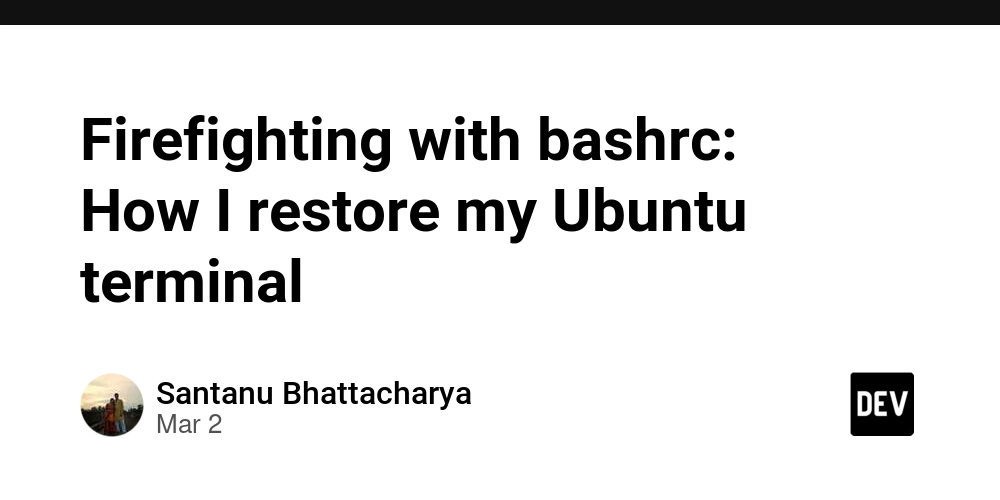Firefighting with bashrc: How I restore my Ubuntu terminal
Restoring My Ubuntu Terminal After a Corrupt .bashrc Recently, I encountered an issue with my .bashrc file on my Ubuntu system that left my terminal unusable, eventually all stuffs like developing, running, testing halts. Here’s how I identified and resolved the problem. The Issue Begins I was trying to install WebLogic on my local system to check for compatibility issues. My Java version at the time was: openjdk version "1.8.0_302" OpenJDK Runtime Environment (build 1.8.0_302-b08) OpenJDK 64-Bit Server VM (build 25.302-b08, mixed mode) When I attempted to execute the WebLogic installer JAR file with the command: java -jar fmw-....jar it fails. Checking the error logs, I found the following message: the openjdk jvm is not supported on this platform. Switching to Oracle Java The installer required Oracle Java, but I was using SDKMAN! to manage my Java versions. SDKMAN is similar to RVM for Ruby, but due to licensing restrictions, it no longer provides Oracle Java. To work around this, I decided to switch to Zulu JDK but ultimately opted to manually install Oracle JDK 8 instead. Steps I Took: Downloaded Oracle JDK 8 and extracted it. Placed it in /opt/java/jdk. Set JAVA_HOME, ensuring it pointed to the new JDK instead of SDKMAN. After setting the new path, I verified the Java version: java version "1.8.0_431" Java(TM) SE Runtime Environment (build 1.8.0_431-b10) Java HotSpot(TM) 64-Bit Server VM (build 25.431-b10, mixed mode)

Restoring My Ubuntu Terminal After a Corrupt .bashrc
Recently, I encountered an issue with my .bashrc file on my Ubuntu system that left my terminal unusable, eventually all stuffs like developing, running, testing halts. Here’s how I identified and resolved the problem.
The Issue Begins
I was trying to install WebLogic on my local system to check for compatibility issues. My Java version at the time was:
openjdk version "1.8.0_302"
OpenJDK Runtime Environment (build 1.8.0_302-b08)
OpenJDK 64-Bit Server VM (build 25.302-b08, mixed mode)
When I attempted to execute the WebLogic installer JAR file with the command:
java -jar fmw-....jar
it fails.
Checking the error logs, I found the following message:
the openjdk jvm is not supported on this platform.
Switching to Oracle Java
The installer required Oracle Java, but I was using SDKMAN! to manage my Java versions. SDKMAN is similar to RVM for Ruby, but due to licensing restrictions, it no longer provides Oracle Java.
To work around this, I decided to switch to Zulu JDK but ultimately opted to manually install Oracle JDK 8 instead.
Steps I Took:
Downloaded Oracle JDK 8 and extracted it.
Placed it in /opt/java/jdk.
Set JAVA_HOME, ensuring it pointed to the new JDK instead of SDKMAN.
After setting the new path, I verified the Java version:
java version "1.8.0_431"
Java(TM) SE Runtime Environment (build 1.8.0_431-b10)
Java HotSpot(TM) 64-Bit Server VM (build 25.431-b10, mixed mode)










































































































































































![[The AI Show Episode 142]: ChatGPT’s New Image Generator, Studio Ghibli Craze and Backlash, Gemini 2.5, OpenAI Academy, 4o Updates, Vibe Marketing & xAI Acquires X](https://www.marketingaiinstitute.com/hubfs/ep%20142%20cover.png)



























































































































![[FREE EBOOKS] The Kubernetes Bible, The Ultimate Linux Shell Scripting Guide & Four More Best Selling Titles](https://www.javacodegeeks.com/wp-content/uploads/2012/12/jcg-logo.jpg)



![From drop-out to software architect with Jason Lengstorf [Podcast #167]](https://cdn.hashnode.com/res/hashnode/image/upload/v1743796461357/f3d19cd7-e6f5-4d7c-8bfc-eb974bc8da68.png?#)






































































































.png?#)




.jpg?#)































_Christophe_Coat_Alamy.jpg?#)








































































































![Rapidus in Talks With Apple as It Accelerates Toward 2nm Chip Production [Report]](https://www.iclarified.com/images/news/96937/96937/96937-640.jpg)









































































































































